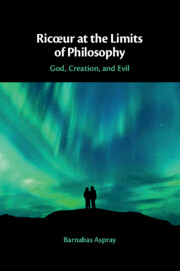Refine search
Actions for selected content:
2 results

Ricœur at the Limits of Philosophy
- God, Creation, and Evil
-
- Published online:
- 18 August 2022
- Print publication:
- 25 August 2022
2 - Reason
-
- Book:
- Taking God Seriously
- Published online:
- 29 January 2021
- Print publication:
- 18 February 2021, pp 29-58
-
- Chapter
- Export citation
